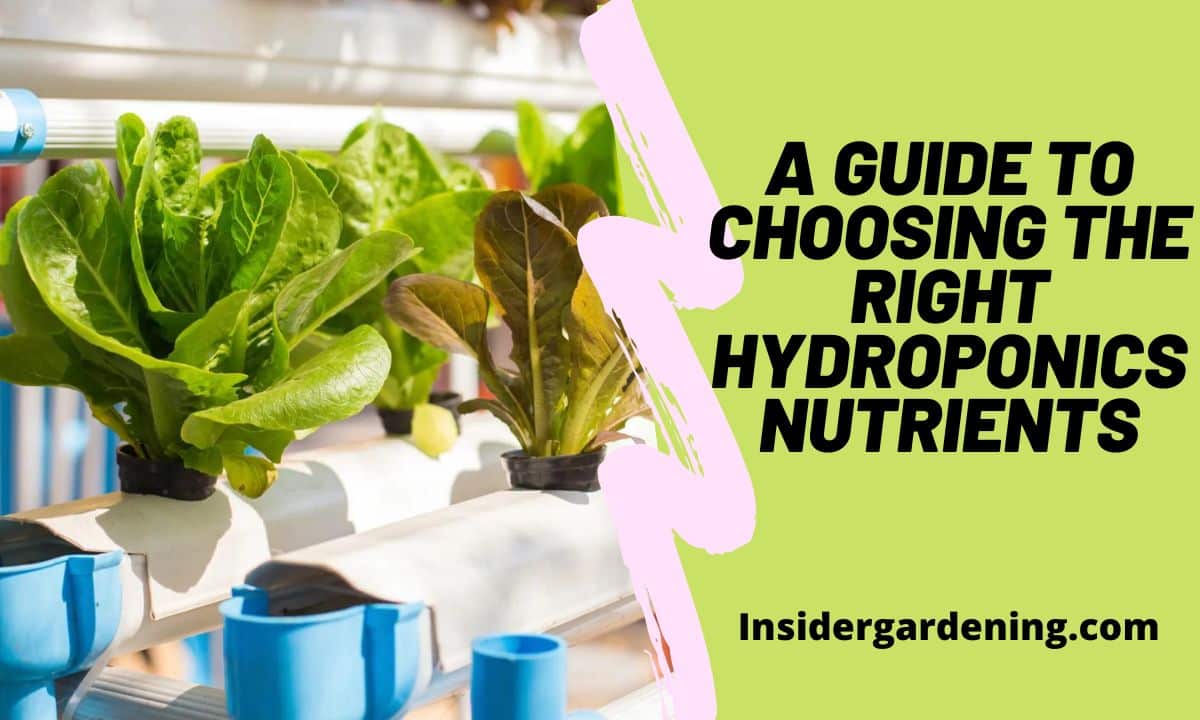A Guide to Choosing the Right Hydroponics Nutrients

In hydroponics, providing the right nutrients to your plants is essential for their healthy growth and abundant yields. Unlike traditional soil-based gardening, hydroponic plants rely on a nutrient solution to get all the essential minerals they need. Choosing the right hydroponics nutrients can make a significant difference in the success of your indoor garden. Here’s a comprehensive guide to help you make informed decisions when selecting nutrients for your hydroponic setup.
1. Understanding Hydroponic Nutrients
Hydroponic nutrients are typically formulated as a complete solution containing essential macronutrients and micronutrients that plants need to thrive. The primary macronutrients are nitrogen (N), phosphorus (P), and potassium (K), while micronutrients include elements like iron, calcium, magnesium, and more. Different stages of plant growth require varying nutrient ratios, so it’s essential to choose nutrient solutions designed for specific growth phases.
2. Types of Hydroponics Nutrients
There are two main types of hydroponic nutrient solutions:
1. Pre-Mixed Nutrients
Pre-mixed nutrients come in ready-to-use formulas, making them convenient for beginners or those who prefer a hassle-free approach. These solutions are usually labeled for specific plant stages (e.g., vegetative or flowering) and contain all the necessary nutrients in the correct proportions.
2. Customizable Nutrients
Customizable nutrient solutions allow more precise control over nutrient ratios and are favored by experienced hydroponic growers. With this option, you can tailor the nutrient solution to suit the specific needs of your plant varieties and growth stages.
3. Check the N-P-K Ratio
The N-P-K ratio indicates the relative proportions of nitrogen (N), phosphorus (P), and potassium (K) in the nutrient solution. Different plants have varying nutrient requirements, so ensure the chosen nutrient solution matches your plants’ specific needs. For example, leafy greens prefer higher nitrogen levels (e.g., 3-1-2 ratio), while flowering plants may require higher phosphorus for better blooming (e.g., 1-4-5 ratio).
4. Consider Secondary Macronutrients
In addition to the primary macronutrients (N-P-K), some nutrient solutions also include secondary macronutrients like calcium (Ca), magnesium (Mg), and sulfur (S). These elements are vital for overall plant health and growth, so choosing a nutrient solution that includes them can be beneficial.
5. Look for Chelated Micronutrients
Chelated micronutrients are those in a form that plants can readily absorb. These are particularly important in hydroponics, where plant roots directly access the nutrient solution. Chelated micronutrients ensure efficient nutrient uptake and reduce the risk of nutrient deficiencies.
6. pH-Balanced Nutrients
A good hydroponic nutrient solution should have a balanced pH level (around 5.5 to 6.5) to ensure optimal nutrient absorption by the plant roots. Some nutrient solutions come with pH buffers to help stabilize the pH level of the water.
7. High-Quality and Water-Soluble
Choose high-quality hydroponic nutrients from reputable brands. Water-soluble nutrients are ideal for hydroponics, as they mix easily with water and won’t clog your system.
8. Monitor Plant Response
After selecting a nutrient solution, closely monitor your plants’ response to the nutrients. Observe their growth, leaf color, and overall health. Adjust the nutrient levels if needed based on any signs of nutrient deficiencies or imbalances.
9. Key Components of Hydroponic Nutrients
When evaluating hydroponic nutrients, consider the following critical components:
| Component | Role in Plant Growth | Ideal Concentration Range |
|---|---|---|
| Nitrogen (N) | Leaf Growth, Green Color | 100-200 ppm |
| Phosphorus (P) | Root Development, Flowering | 30-60 ppm |
| Potassium (K) | Overall Plant Health | 100-200 ppm |
| Calcium (Ca) | Cell Wall Development | 100-200 ppm |
| Magnesium (Mg) | Photosynthesis, Flowering | 40-80 ppm |
| Sulfur (S) | Disease Resistance, Flavor | 30-60 ppm |
| Micronutrients | Various Biochemical Processes | Varies by Element |
10. Choosing the Right Nutrient Formula
A. Growth Stage:
- Seedlings/Clones: Higher P (Phosphorus) for root development.
- Vegetative Growth: Balanced NPK with slightly higher N.
- Flowering/Fruiting: Increased P and K, with a focus on micronutrients for fruit quality.
B. Plant Type:
- Leafy Greens: Higher N, balanced micronutrients.
- Fruiting Plants: Balanced NPK with emphasis on K and micronutrients.
- Flowers: Similar to fruiting plants, with a focus on micronutrients for bloom quality.
C. System Type:
- DWC, NFT, Ebb & Flow: More frequent feeding with balanced, water-soluble nutrients.
- Coco Coir, Rockwool: Buffered coco or rockwool-specific nutrients to manage pH fluctuations.
11. Special Considerations for Optimal Growth
- pH Management: Regularly monitor and adjust the pH of your nutrient solution (ideal range: 5.5-6.5).
- EC/PPM Management: Balance nutrient strength to avoid under/overfeeding.
- Organic vs. Synthetic: Choose based on your garden’s philosophy and plant requirements. Organic nutrients may offer slower release rates, while synthetic nutrients provide immediate availability.
12. Common Mistakes to Avoid
- Overfeeding: This leads to nutrient burn and reduced plant performance.
- Neglecting Water Quality: Poor water can negate the benefits of premium nutrients.
- Inconsistent Feeding Schedules: Fluctuations can stress plants, reducing yields.
Conclusion
Choosing the right hydroponics nutrients is a critical step in ensuring a successful indoor garden. Consider the specific needs of your plants, the growth stage, and the nutrient solution’s N-P-K ratio to make the best choice. Regularly monitor and maintain the nutrient solution to provide your plants with the essential elements they need for robust and fruitful growth.
With proper care and attention to nutrient management, you’ll be rewarded with a flourishing and productive hydroponic garden that yields fresh and nutritious produce all year round.
Read More: LetPot LPH-Max Hydroponics Growing System Kit Review